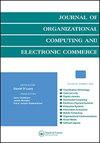DERIVING TRUST-SUPPORTING DESIGN KNOWLEDGE FOR AI-BASED CHATBOTS IN CUSTOMER SERVICE: A USE CASE FROM THE AUTOMOTIVE INDUSTRY
IF 1.9
4区 管理学
Q3 COMPUTER SCIENCE, INFORMATION SYSTEMS
Journal of Organizational Computing and Electronic Commerce
Pub Date : 2023-11-08
DOI:10.1080/10919392.2023.2276631
引用次数: 0
Abstract
ABSTRACTIn the automotive industry, companies are increasingly implementing Artificial Intelligence (AI)-based chatbots to support various processes, especially in the context of customer service. However, there currently is a lack of knowledge, especially systematically derived design knowledge, regarding customer trust in interacting with AI-based chatbots. In this context, a lack of security and transparency, limited social features, and the communication style and quality-related issues of AI-based chatbots are just a few aspects that inhibit customer trust in interacting with this innovative technology, thereby hindering the adoption of chatbots. To address this knowledge gap, we adopted a design theory-based approach and developed a design concept for trust-supporting design knowledge regarding customer interaction with an AI-based chatbot. Design science provides a structured development and evaluation process to support, for example, the adoption of AI-based chatbots. Drawing on trust-based literature, a use case in customer service in the automotive industry, and seven semi-structured expert interviews, we propose 10 meta/user requirements and four design principles for trust-supporting design elements as (e.g. social) signals (stimuli) regarding the interaction with AI-based chatbots. We developed two click prototypes over two evaluation cycles. Each evaluation included an online survey with 180 participants. The findings that were obtained make a valuable contribution to solving the described lack of design knowledge by developing and evaluating different design approaches in the form of prototypical user interfaces. Moreover, the results show that visible design elements such as transparent and factual security signals (stimuli) and trust seals have a significant impact on customer trust.KEYWORDS: AI-based chatbotcustomer servicetrust signaldesign science research Disclosure statementNo potential conflict of interest was reported by the author(s).Additional informationNotes on contributorsMartin SonntagMartin Sonntag (LinkedIn profile) is an external doctoral student at Jade University of Applied Sciences and conducts research on Industry 4.0, Artificial Intelligence, and AI-based chatbots in customer service.Jens MehmannJens Mehmann studied industrial engineering with a focus on process optimization and project management at Osnabrück University of Applied Sciences. He completed his doctorate at the Chair of Business Accounting and Information Systems at the University of Osnabrück. Since 2018, he has been Professor of Supply Chain Management and Operations at Jade University. In 2021, he founded the Institute for Innovative Logistics and the Environment. He is also the founder of Leannova. Leannova is a management consultancy that accompanies companies in the context of digital transformation. In the business areas of process optimization, factory and warehouse planning and IT services, innovative concepts are developed and implemented together with the customers. The project work results in application-oriented research, which is also accompanied by final theses and student projects. An innovation driver can therefore be spoken of. He is author of scientific and practice-oriented publications. His research focuses on process optimization, automation and digitization, digital transformations and open innovation.Frank TeutebergDr. Frank Teuteberg is a full professor at the Osnabrück University in Germany. Since 2007 he has been Head of the Department of Accounting and Information Systems, which is part of the Institute of Information Management and Information Systems Engineering at the Osnabrück University. He is the spokesman of the research profile line Digital Society – Innovation – Regulation and the leader of several research projects with a funding volume of more than € 15 million in total. He is also the founder of synovacom. Synovacom is an IT consultancy that supports companies in the context of digital transformation, particularly in the areas of conception, implementation and evaluation of innovative digitization projects and digital solutions (e.g. AI solutions) as well as in the area of data analytics and digital business models. Furthermore, he is the author of more than 450 research papers with more than 7000 citations in numerous peer-reviewed journals (e.g. Technological Forecasting and Social Change, Information & Management) and conferences (e.g. International Conference on Information Systems) in the field of industrial Internet of things, e-health, artificial intelligence, blockchain, and human computer interaction.为客户服务中基于人工智能的聊天机器人获取支持信任的设计知识:来自汽车行业的一个用例
在汽车行业,公司越来越多地实施基于人工智能(AI)的聊天机器人来支持各种流程,特别是在客户服务的背景下。然而,目前缺乏关于客户信任与基于人工智能的聊天机器人交互的知识,特别是系统派生的设计知识。在这种情况下,缺乏安全性和透明度,有限的社交功能,以及基于人工智能的聊天机器人的沟通风格和质量相关问题只是抑制客户信任与这种创新技术互动的几个方面,从而阻碍了聊天机器人的采用。为了解决这一知识差距,我们采用了一种基于设计理论的方法,并开发了一种关于客户与基于人工智能的聊天机器人交互的信任支持设计知识的设计概念。设计科学提供了一个结构化的开发和评估过程来支持,例如,采用基于人工智能的聊天机器人。根据基于信任的文献、汽车行业客户服务用例和7个半结构化专家访谈,我们提出了10个元/用户需求和4个设计原则,以支持与基于人工智能的聊天机器人交互的信任设计元素(例如社交)信号(刺激)。我们在两个评估周期中开发了两个点击原型。每次评估都包括一项180人参与的在线调查。通过以原型用户界面的形式开发和评估不同的设计方法,获得的发现对解决所描述的设计知识缺乏做出了有价值的贡献。此外,研究结果显示,透明和真实的安全信号(刺激)和信任印章等可见设计元素对客户信任有显著影响。关键词:人工智能聊天客户服务信任信号设计科学研究披露声明作者未报告潜在利益冲突。martin Sonntag (LinkedIn简介)是玉德应用科技大学的一名外部博士生,主要研究工业4.0、人工智能和基于人工智能的聊天机器人在客户服务中的应用。Jens Mehmann在osnabrck应用科学大学学习工业工程,专注于流程优化和项目管理。他在奥斯纳布尔克大学(University of osnabrck)完成了商业会计和信息系统的博士学位。自2018年起,他一直担任翡翠大学供应链管理与运营教授。2021年,他创立了创新物流与环境研究所。他也是Leannova的创始人。Leannova是一家在数字化转型背景下陪伴企业的管理咨询公司。在流程优化、工厂和仓库规划以及IT服务等业务领域,我们与客户共同开发和实施创新概念。项目工作成果为应用型研究,并附有毕业论文和学生专题。因此,可以说是创新驱动。他是科学和实践导向出版物的作者。主要研究方向为流程优化、自动化与数字化、数字化转型与开放式创新。弗兰克TeutebergDr。Frank Teuteberg是德国奥斯纳布尔大学的正教授。自2007年以来,他一直担任会计和信息系统部门的负责人,该部门是osnabrck大学信息管理和信息系统工程研究所的一部分。他是研究概况线数字社会-创新-监管的发言人,并领导了几个研究项目,总资金量超过1500万欧元。他也是synovacom的创始人。Synovacom是一家IT咨询公司,在数字化转型的背景下为公司提供支持,特别是在创新数字化项目和数字解决方案(如人工智能解决方案)的概念、实施和评估领域,以及在数据分析和数字商业模式领域。此外,他还在工业物联网、电子医疗、人工智能、区块链和人机交互领域的众多同行评审期刊(如技术预测与社会变革、信息与管理)和会议(如国际信息系统会议)上发表了450多篇研究论文,被引用7000多次。
本文章由计算机程序翻译,如有差异,请以英文原文为准。
求助全文
约1分钟内获得全文
求助全文
来源期刊

Journal of Organizational Computing and Electronic Commerce
工程技术-计算机:跨学科应用
CiteScore
5.80
自引率
17.20%
发文量
7
审稿时长
>12 weeks
期刊介绍:
The aim of the Journal of Organizational Computing and Electronic Commerce (JOCEC) is to publish quality, fresh, and innovative work that will make a difference for future research and practice rather than focusing on well-established research areas.
JOCEC publishes original research that explores the relationships between computer/communication technology and the design, operations, and performance of organizations. This includes implications of the technologies for organizational structure and dynamics, technological advances to keep pace with changes of organizations and their environments, emerging technological possibilities for improving organizational performance, and the many facets of electronic business.
Theoretical, experimental, survey, and design science research are all welcome and might look at:
• E-commerce
• Collaborative commerce
• Interorganizational systems
• Enterprise systems
• Supply chain technologies
• Computer-supported cooperative work
• Computer-aided coordination
• Economics of organizational computing
• Technologies for organizational learning
• Behavioral aspects of organizational computing.
 求助内容:
求助内容: 应助结果提醒方式:
应助结果提醒方式:


